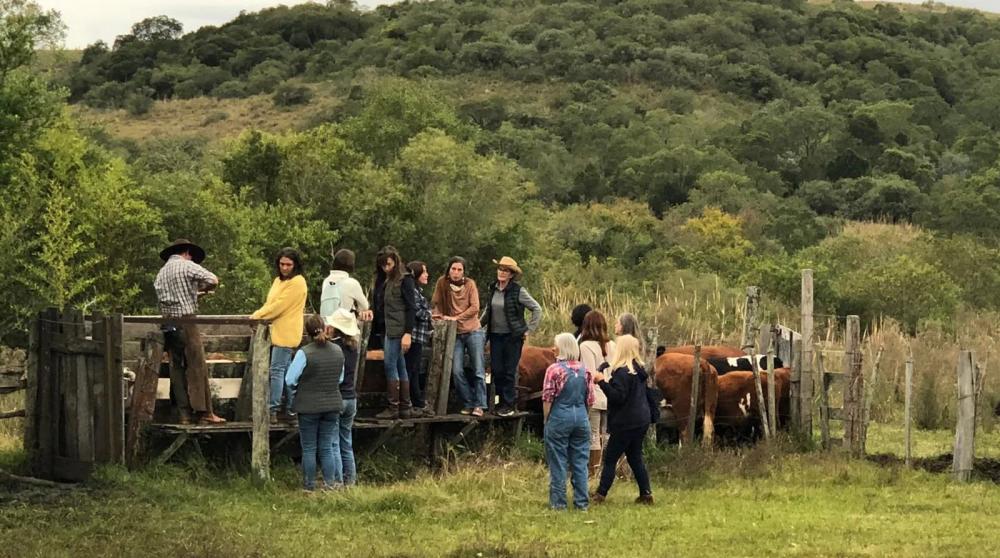Eroded soils can regenerate and become fertile land for agriculture, state members of Pampeanas Regenerativas Orientales in new episode of the IICA en Acción podcast

Montevideo, 9 August 2023 (IICA). Eroded or worn-out soils can regenerate and become fertile and healthy land for agriculture. The members of Pampeanas Regenerativas Orientales, a group of women from Uruguay, are certain of this, based on their experience in agricultural and livestock fields. “The key is to shift our mindset” and begin to apply practices that are neither costly nor difficult but can make a difference.
This is the topic addressed in the latest episode of IICA en Acción (IICA in Action), a podcast of the Inter-American Institute for Cooperation on Agriculture (IICA) that includes a segment devoted to the Living Soils of the Americas initiative spearheaded by the organization specializing in agriculture and rural life in the hemisphere together with the Rattan Lal Carbon Management and Sequestration Center (C-MASC) of The Ohio State University.
In the interview, available on the IICA en Acción Spotify channel, Magdalena Urioste, one of the founders of Pampeanas –which is now comprised of more than a hundred women– describes regeneration activities and how, in just a few years, she has witnessed worn-out, rocky land become much healthier, supporting greater and improved livestock production.
“When we talk about regeneration, we are not just referring to soil, but to the food we consume, and, in turn, human health as well”, explained Urioste, from Uruguay.
“Our focus is changing the extractivist culture in the countryside”, she added.
She recalled that, when a few women first began thinking about ways to improve the quality of their fields and the food they produce, “there was no talk of regeneration in Uruguay. Everything was ‘sustainable’. But I think of sustainability as keeping things as they are, as opposed to regeneration, which is breathing new life into things. We have created a new vision for the work carried out in the countryside”, she noted.
A livestock producer in one of the most fertile areas of South America, Magdalena Urioste explained the importance of allowing the roots of pasture grasses to grow and develop, so that they may fully nourish the soil while also feeding livestock.
“The biodiversity of subsoil is what gives life to everything above ground. If we have soil, we have pastures, and if we have pastures, we have healthy cows”, she explained.
By sharing their personal experiences, this rural producer and the entire Pampeanas Regenerativas group seeks to demonstrate that, by making just a few changes and without the need for costly investments, it is possible to substantially improve the quantity and quality of production, at a time when the world is concerned about food security and protecting the planet from the growing threat of climate change.
Pampeanas Regenerativas Orientales is the latest participant in IICA en Acción, a podcast aimed at communicating and disseminating topics of interest related to agrifood production in the Americas.
The Living Soils of the Americas initiative is spearheaded by IICA together with the research center run by renowned expert Rattan Lal, 2020 World Food Prize winner.
The initiative links science, public policies, the private sector and work to rehabilitate the hemisphere’s degraded soils, which are threatening the position of Latin America and the Caribbean as the guarantor of the world’s food security. Syngenta, Bayer and PepsiCo are private sector members of the initiative.
Several experts, officials and partners have participated in the segment of the IICA en Acción podcast dedicated to the project, including IICA Director General Manuel Otero; award-winning Rattan Lal; Argentine Secretary of Agriculture, Livestock and Fisheries, Juan José Bahillo; and the Chief of the Natural Resources and Conservation Service of the United States Department of Agriculture, Terry Cosby. Other interviewees have included officials from Canada, Mexico, Brazil, as well as experts from international organizations and different countries of the Americas, all of whom are determined to further innovation and drive progress towards an agriculture sector that is increasingly committed to protecting the environment and caring for the life of humans and all living species.
More information:
Institutional Communication Division.
comunicacion.institucional@iica.int